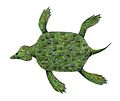Seeleyosaurus
| Seeleyosaurus Temporal range: Early Jurassic,
| |
|---|---|

| |
| Cast of Seeleyosaurus guilelmiimperatoris fossil with reconstructed parts based on the holotype | |
| Scientific classification | |
| Domain: | Eukaryota |
| Kingdom: | Animalia |
| Phylum: | Chordata |
| Class: | Reptilia |
| Superorder: | †Sauropterygia |
| Order: | †Plesiosauria |
| Family: | †Microcleididae |
| Genus: | †Seeleyosaurus White, 1940 |
| Type species | |
| †Seeleyosaurus guilelmiimperatoris (Dames, 1895)
| |
| Synonyms | |
| |
Seeleyosaurus is an extinct genus of plesiosaur that was initially placed within the genus Plesiosaurus in 1895[1] and was given its own genus in 1940.[2] Two species were known: the type, S. guilelmiimperatoris, and the now obsolete species S. holzmadensis,[2] which has since been absorbed into S. guilelmiimperatoris. It was a relatively small plesiosaur, measuring 2.9–3.6 m (9.5–11.8 ft) long.[3][4] The holotype is MB.R.1992, a large almost complete skeleton from the Upper Lias (Toarcian) Lias Group Formations of Württemberg, Germany. There seems to be the impression of a rhomboidal flap of skin in a vertical plane; if so, many plesiosaurs may have been equipped in this way.[5] A second specimen (SMNS 12039), preserved in 3D, is the holotype of S. holzmadensis.[2]
Classification
The following cladogram follows an analysis by Ketchum & Benson, 2011.[5]
Gallery
-
Restoration
-
Holotype of S. guilelmiimperatoris in 1895[1]
-
Seeleyosaurus (left) and Thaumatosaurus, now Meyerasaurus (right) as depicted in Water reptiles of the past and present (1914)
See also
References
- ^ a b Dames, H. W. (1895). Die Plesiosaurier der süddeutschen Liasformation. Abhandlungen der Königlichen Akademie der Wissenschaften zu Berlin 2:1-83
- ^ a b c White, T. E. (1940). Holotype of Plesiosaurus longirostris Blake and classification of the plesiosaurs. Journal of Paleontology 14(5):451-467
- ^ Peggy Vincent (2011). "A re-examination of Hauffiosaurus zanoni, a pliosauriod from the Toarcian (Early Jurassic) of Germany". Journal of Vertebrate Paleontology. 31 (2): 340–351. doi:10.1080/02724634.2011.550352. S2CID 84743241.
- ^ Valentin Fischer; Nikolay G. Zverkov; Maxim S. Arkhangelsky; Ilya M. Stenshin; Ivan V. Blagovetshensky; Gleb N. Uspensky (2020). "A new elasmosaurid plesiosaurian from the Early Cretaceous of Russia marks an early attempt at neck elongation". Zoological Journal of the Linnean Society. 192 (4): 1167–1194. doi:10.1093/zoolinnean/zlaa103. hdl:2268/251614.Supplementary Information
- ^ a b Ketchum, Hillary F.; Benson, Roger B.J. (2011). "A new pliosaurid (Sauropterygia, Plesiosauria) from the Oxford Clay Formation (Middle Jurassic, Callovian) of England: evidence for a gracile, longirostrine grade of Early-Middle Jurassic pliosaurids". Special Papers in Palaeontology. 86: 109–129.


![Holotype of S. guilelmiimperatoris in 1895[1]](http://upload.wikimedia.org/wikipedia/commons/thumb/1/17/Seleyosaurus_holotype_1895.png/120px-Seleyosaurus_holotype_1895.png)







